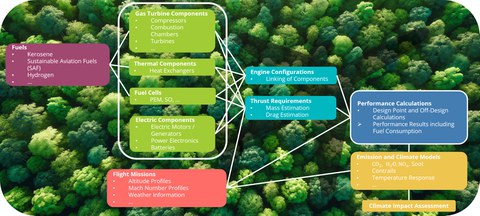Engine Performance Modeling of Next Generation Jet Engines - MAPLE
Project director: Prof. Dr.-Ing. habil. Ronald Mailach
Research Associate: Dipl.-Ing. Marcus Wiegand
Duration: 10/2023 – 09/2026
Motivation
Reducing climate-damaging emissions is a key objective of today's aviation industry. Suitable approaches include emission-optimized flight profiles and the use of novel propulsion technologies. This includes hybrid-electric and hydrogen powered engines as well as advanced thermal management systems. In order to quickly identify and quantify their potential, powerful 0D engine performance models are needed to calculate them in design point and in off-design conditions.
The uncertainty associated with input assumptions and model inaccuracies should be quantified and considered during the design process of novel engine concepts.
Input parameters of both the engine components and the flight missions can be optimized to minimize the climate impact of next generation jet engines.
Methodology
For this reason, the Chair of Turbomachinery and Flight Propulsion at Technische Universität Dresden is developing the modular 0D engine model Maple (“Modular Aircraft Engine Performance for Sustainable Aviation”), which can be used to build novel configurations, conduct performance calculations, and estimate emissions and the climate impact of conventional and novel propulsion concepts along realistic flight missions. Special emphasis is laid on a flexible, modular design, so that the framework can be extended by additional components and new configurations. Established conventional configurations as well as various (hybrid-) electric configurations are implemented. Validation against an established commercial reference shows deviations well below one percent.
Analysis
The modular structure and easy adaptability of the tool are ideal for the efficient design and calculation of state-of-the-art and future aircraft engines. It enables the fast and comprehensive evaluation of new concepts in the first design stage. The tool allows estimating the engines impact on flight mission fuel consumption and emissions, and thus on the climate.
An exemplary comparison of a conventional turbofan engine and a parallel hybrid-electric engine shows that fuel savings are achieved with advanced electric technologies and battery energy densities for shorter flight missions. However, with state-of-the-art batteries, the consideration of thermal management systems, and for longer flight missions, the advantages vanish.
Publications
Wiegand, M., Schuchard, L., Krüger, T., Mailach, R.:
"Development of a Modular Engine Performance Calculation Tool for Prediction of Conventional and Hybrid-Electric Aircraft Engines“ ASME TURBO Expo 2024, London, GT2024-125821.
Krüger, T., Wiegand, M., Condriuc, I., Schuchard, L, and Mailach, R.: “Ein Modulare Leistungsrechnungsprogramm für konventionelle und hybrid-elektrische Flugantriebe“, Deutscher Luft- und Raumfahrtkongress, 2023, Stuttgart, Deutschland.
Wiegand, M.: "Entwicklung eines Berechnungsprogramms für disruptive hybrid-elektrische Flugantriebe.", StuFoExpo 2022, TU Dresden, 2023. DOI 10.25368/2023.45

